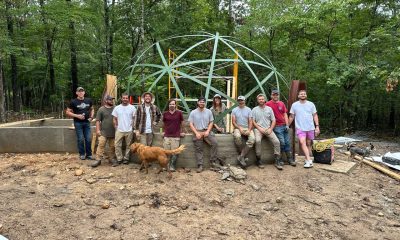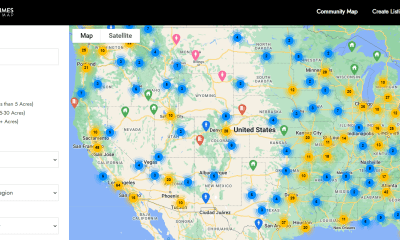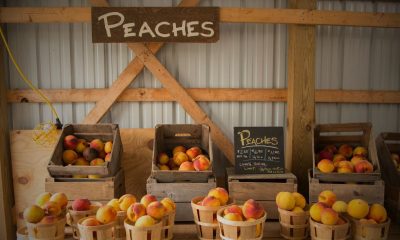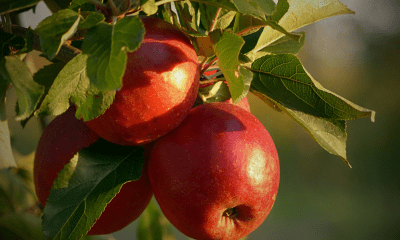Lifestyle
Dark Chocolate, Green Tomato & Yogurt Cupcakes
There’s green tomatoes in those? How dare you…

If you’re anything like us, you’ve got a boatload of green tomatoes to work through this harvest season. Frosts came a bit early this year for a lot of us, so tomatoes were picked before fully ripening, in order to save them from frost damage. A lot of them will ripen on their own indoors, eventually, but there is also PLENTY you can do with the green, unripe ones in the meantime.
You’ve probably heard of fried green tomatoes. Wonderful things. Salsa verde. Muy delicioso. And of course the many many relishes, dips, and pickled recipes like Chow Chow, Piccalilli, Chutney, etc. All fantastic. But have you heard that you can also bake with green tomatoes?
Why yes, yes you can.
Green tomatoes work the same way as zucchini does in baked goods. They provide moisture, and a bit of fibrous heft, while not affecting the taste in an overwhelming way. Even the most finicky, texture-sensitive palates are likely to not even notice the addition. As an added bonus, green tomatoes are packed with Vitamins A, C, and potassium. Look at that, your decadent dessert just became a health(ish) food. You’re welcome.
Ready to try? Grab your muffin tins and let’s go!
Dark Chocolate, Green Tomato & Yogurt Cupcakes
Makes 8 Medium-sized cupcakes
Ingredients:
1 Cup All Purpose flour
1/2 Tsp Baking Powder
1/2 Tsp Baking Soda
1/4 Tsp Pink Himalayan Salt
1/2 Cup Cocoa Powder
1/4 Tsp Cinnamon
3/4 Cup Dark Chocolate Chips
2 Eggs
1/2 Cup Plain Yogurt
1/2 Cup Unrefined White Sugar
1/2 Cup Light Brown Sugar
1 Tsp Vanilla Extract
1 1/2 Cups Grated or Pureed Green Tomato
Butter for greasing tins (optional)
Baking Directions
First step is grating or semi-pureeing your green tomatoes. I’ve done both, but prefer to pulse them in the blender a few times to get a chunky puree, as grating may leave some more visible tiny tomato skin pieces in the final product. Taste is not really affected, though. When you’ve reached 1 1/2 cups of grated/pureed tomato, leave them in a colander or mesh strainer for a few minutes, up to 30, to drain off excess water.
As the tomatoes are draining, preheat the oven to 375 degrees. Prepare your muffin tins by either greasing them with butter, or lining with paper cups.
In a small bowl, mix your dry ingredients together, up to and including the chocolate chips.
In a larger bowl, mix the eggs, yogurt, sugars, and vanilla. Then fold in your tomato.
Add your dry ingredients to the wet, and gently mix together until the dry ingredients are moistened. Do not over-mix. Chunks are fine! You’re not going for a silky smooth batter, rather a semi-rough looking, but moist and airy blend.
Spoon mixture into muffin tins, filling about 3/4 full. Fill any empty tin spaces with water, to ensure even baking.
Bake for 20-25 minutes, or until a toothpick poked in the center comes out clean. Cool for 10 mins before removing from the tins. Let cool completely before adding your favorite frosting, if doing so. These moist, delicious treats can be savored with or without.
Enjoy!
Guest Submission by:
-Breanna
@ameliaameliorate on Instagram

Social media shows doomsayers, pessimists, and even truther-prepper types blasting out warnings of impending doom and gloom. You may feel the urge to fight if you can bear this without your emotions causing you to flee or freeze.
But what does fighting for your future mean? Unfortunately, much internet commentary directs your focus to what others are doing and how they affect you, calling for action to demand change. While this may have its place, it neglects the freedom we already possess and can inadvertently bypass our authority and control.
Here are a few simple things to think about that can help you fight against the future you don’t want, by building the future you do want.
Financial Future
Securing your financial stability is the cornerstone of building a successful future. This starts with becoming debt-free. Debt is a shackle that limits your freedom and ties you to a system you might not align with. Aim to clear your debts quickly and avoid taking on new ones.
Next, focus on land ownership. Owning land provides a place to call home and offers opportunities for self-sufficiency, such as gardening, raising livestock, or even setting up a small business. This autonomy can buffer against economic uncertainties and offer a sense of security.
Continually work towards a sustainable income. Whether through traditional employment, investments, freelancing, or entrepreneurial ventures, ensure your income sources are diversified and resilient to economic shifts. Build skills that are in demand and can be adapted to various roles. Financial independence is crucial in crafting a future you control rather than one external force dictates.
Education
Education is the foundation of personal and professional growth. Embrace self-study and continuous learning. The more skills and knowledge you acquire, the more adaptable you become in a rapidly changing world. Invest in personal improvement by setting aside time for reading, courses, and practical skill-building.
Homeschooling is another powerful tool. It allows you to tailor education to your family’s needs and values, ensuring your children learn what truly matters. Foster a love of learning in your household, emphasizing critical thinking, creativity, and practical skills over rote memorization.
Family Protection
Protecting your family goes beyond physical safety; it involves being a guiding force and a source of stability. We must also protect our families from negative and misguided influences. Be a leader to your children by setting a positive example. Teach them resilience, self-reliance, and the importance of moral values. Strengthen bonds with your siblings through support and cooperation, creating a solid familial network.
Honoring your seniors is equally essential. They possess invaluable wisdom and experience. Encourage intergenerational communication and respect, ensuring your family’s heritage and lessons are passed down.
Mindset
Your mindset is the driving force behind every action. Take ownership of your life and decisions, understanding that responsibility and accountability are keys to freedom. Respect your time and finances, recognizing them as finite resources that require careful management.
Develop a mindset of resilience and adaptability. Life is unpredictable, and being mentally prepared for challenges ensures you can face them head-on. Cultivate a positive outlook, focusing on solutions rather than problems. This proactive attitude will guide you in building the life you want.
Community Building
No one succeeds alone. Connect with people who share your values and vision. Building a community of like-minded individuals offers support, shared resources, and collective wisdom. Engage in activities and friendships that bring joy and complement your life.
We would like to take it a step further by saying, we don’t build the future we want as a reaction to the future we don’t want. We build, because we love, its fun and fulfilling. Our fight is to thrive, not to survive. Survival is a consequence of thriving. So aim high! Take control of your life, embrace self-responsibility, and connect with others on the same path.
Those looking to connect with a broader network should consider joining our Community app. It’s a platform dedicated to bringing together individuals who strive for independence. Whether you’re looking for advice, collaboration, or simply companionship on your journey, our thriving community is a valuable resource.
The power to shape your future is in your hands.
Lifestyle
Making Pine Needle Soda: A Fantastic Foraged Beverage
Pine needle soda, a truly one-of-a-kind beverage, has been savored worldwide for its zesty taste and health benefits.

Pine needle soda, a truly one-of-a-kind beverage, has been savored worldwide for its zesty taste and health benefits. It’s not just a refreshing drink, but also a creative use of natural ingredients. Here’s a simple guide to crafting this unique soda at home.
Pine needles are rich in antioxidants and vitamin C, which help boost the immune system. Different species of needles can offer different flavors, but it’s important to make sure the trees you harvest from are not toxic. Avoid using needles from yew, Norfolk Island pine, or Ponderosa pine. You should do additional research to insure you are staying safe.
The recipe I followed is easy and only requires a jar, strainer, and measuring cups. Start by identifying the pine tree you would like to harvest from; I used fir, tamarack, and white pine. Again, make sure you don’t use anything unsafe. You can choose to use new sprouted tips or even mature needles, which means you can also have fresh pine soda in the winter months!
You can scale up the recipe, but for reference, use the following:
- 2 Cups Pine needles
- 2 Cups Water
- 2-4 Tablespoons sugar (depending on sweetness you desire)
For the above measurements, I recommend using a quart jar. Begin by rinsing the needles, not too thoroughly, because the carbonation comes from natural yeast living on the pine needles. Add the sugar and water and seal the jar. Leave to ferment so it can become bubbly soda! Make sure to “burp” the jar every couple of days to release some of the gas so it does not build up and explode the jar! In 5-7 days, you will have soda, God willing.
Serve over ice and with some citrus if you’d like. Enjoy!
Lifestyle
Reconnect and Rejoice: Beartaria Times Weekly Challenge
Maintaining solid relationships with family and friends offers numerous benefits that enrich our lives in meaningful ways…

In our fast-paced world, losing touch with friends and family members who once played significant roles in our lives is easy. This week, the Beartaria Times invites you to participate in our heartwarming challenge: Reconnect with someone you haven’t spoken to in a while. Give them a call, ask how they’ve been, and rekindle that bond.
Maintaining solid relationships with family and friends offers numerous benefits that enrich our lives in meaningful ways:
1. Emotional Support: Close relationships provide a robust support system during tough times, offering comfort, advice, and a sense of belonging.
2. Improved Mental Health: Regular interactions with loved ones reduces feelings of loneliness and depression, contributing to mental well-being.
3. Increased Longevity: Studies have shown that strong social connections tend to help people live longer and enjoy better health.
4. Enhanced Happiness: Sharing moments, memories, and experiences with others brings joy and fulfillment, fostering a more positive outlook on life.
5. Personal Growth: Friends and family often challenge us to grow, learn, and become better versions of ourselves.
6. Creating Memories: Every interaction creates new memories, adding richness to our personal histories and offering stories to cherish for years to come.
We encourage you to take this challenge to heart and reach out to someone you miss. Whether it’s a friend from high school, a distant relative, or a former colleague, a simple phone call can reignite connections and brighten your day and theirs.
Once you’ve reconnected, share your stories and experiences on the Beartaria Times community app. Post about who you called, the memories you shared, and how the conversation went. Did you learn something new? Did you laugh about old times? These stories can inspire others to take similar steps in their lives.
Join us in this week’s challenge and celebrate the beauty of human connection. Let’s make an effort to nurture our relationships and remind those we care about that they are valued and remembered.
Happy connecting, Beartarians! We look forward to hearing your heartwarming stories.
Sincerly,
– The Beartaria Times Team
-

 Just Crushing2 weeks ago
Just Crushing2 weeks agoChristopher Gardner Completes First Dome Framing Project in Missouri: Exclusive Interview
-

 Just Crushing2 months ago
Just Crushing2 months agoBeartaria Ozark Campground Launches Community Forum!
-

 Just Crushing2 months ago
Just Crushing2 months agoMap it! – Discover Beartarians Living, Working, and Crushing Near You!
-

 Just Crushing2 months ago
Just Crushing2 months agoWhy Do We Feel So Free?
-

 Lifestyle2 months ago
Lifestyle2 months agoReconnect and Rejoice: Beartaria Times Weekly Challenge
-

 Reports2 months ago
Reports2 months agoReport: EF-1 Tornado Touches Down In The Ozarks
-

 Business2 months ago
Business2 months ago3000 Members In Our Business Group!: This Week On Our Community App!
-

 Wellness2 months ago
Wellness2 months agoBeartaria Times Member Shares History and Benefits of Haymaker’s Punch








































